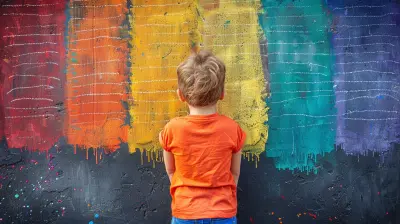Addressing Your Preschooler’s Why Questions with Patience and Curiosity
3 January 2025
Parenting comes with a long list of rewarding (and sometimes challenging) moments. One of these unique phases is when your preschooler starts asking why about everything—literally everything! From why the sky is blue to why they can’t eat ice cream for breakfast, this endless barrage of questions can be adorable, frustrating, and fascinating all at the same time.
But let’s be real—after the 100th "why" in a single afternoon, it can test your patience. However, before you throw in the towel, there’s good news. Those "why" questions are an excellent opportunity for you to foster curiosity, build trust, and help develop your little one’s reasoning skills.
This article is here to help you address your preschooler’s endless "why" questions with patience, curiosity, and maybe even a sprinkle of fun!

Why Do Preschoolers Ask "Why"?
If you've ever felt like your preschooler is a tiny human-sized interrogation machine, you're not alone. But have you ever wondered what’s really going on in their minds when they ask "why"?Preschoolers are at a stage of development where they’re trying to make sense of the world around them. Their brains are spongy, soaking up information at an astonishing rate. Those "why" questions are their way of navigating new concepts and understanding the relationships between cause and effect.
To them, it’s not just idle curiosity—it’s their way of learning how the world works.
Developmental Milestones
Around the age of 2 or 3, children begin to understand that different events have causes and that everything exists for a reason. This cognitive development leads to the infamous "why" questions. They’re looking for answers, and they don’t have the context you and I take for granted. Every new piece of information adds a little more clarity to the big puzzle of life.At this point, the brain is rapidly forming connections, and those why-questions trigger cognitive growth. It's like planting seeds in a garden—every answer adds another petal to the intellectual flower blooming in their tiny minds.
A Drive for Connection
On another level, preschoolers are also looking for connection. They ask "why" not only to learn but also to engage with you. Those questions serve as a bid for your attention, closeness, and reassurance. After all, you’re their guide to the world, and they trust that you have the answers.
Addressing the “Why’s” with Patience
Let’s be honest—when you’ve just spilled your coffee, and you’ve got a work deadline looming, it can be tough to muster the patience to answer yet another "Why is the grass green?" But here’s where patience becomes key. Taking a deep breath and handling it calmly can make a huge difference, both for your child and for your own sanity.1. Remember the Bigger Picture
Think of each "why" question as a chance to nurture curiosity. The way you respond now will shape their attitude towards learning and asking questions in the future. If they feel like their questions are dismissed, they may start to believe that their curiosity isn’t important. Feeding into their inquisitiveness now can lead to a lifetime love of learning.Consider that every "why" is helping to build two important skills: problem-solving and critical thinking. Sure, it might not feel like that when they’re asking, "Why can’t I have candy for dinner?" but your answers teach them to seek out explanations and understand reasoning.
Pro tip: When you're at the end of your rope, remember—these years will pass quicker than you think. You don't want to regret brushing off your child’s desire to learn simply because you were overwhelmed in the moment.
2. Take a Moment Before You Respond
Sometimes, knee-jerk reactions lead to frustration. Instead, pause before responding. This gives you a moment to compose yourself, and sometimes it gets the wheels turning in your own head too. Taking that little pause can help you approach the question in a way that's clear and simple for their age.Not every "why" question will have a readily available answer (because honestly, do you actually know why the sky is blue without Googling it?). In those moments, it’s okay to admit you don’t have all the answers.
3. Choose Your Battles
Let’s face it—you don't have to answer every single question in full detail. Sometimes, it’s okay to redirect or answer with a light-hearted question of your own to redirect their attention. However, when it comes to critical learning opportunities, take those questions seriously and respond with care.For example, if your child asks, "Why do you go to work?" use the opportunity to explain concepts like responsibility, earning money, and contributing to family well-being. These are valuable lessons disguised as simple why’s.

Encouraging Curiosity
Once you’ve managed to squeeze out some patience, it’s time to lean into the beauty of your child’s curiosity. The world is so fresh and exciting to them, and through your eyes, it can be refreshing to rediscover that wonder.1. Encourage Open-Ended Questions
Sometimes, a plain question like "why" is just a starting point. Encourage them to dig deeper. After you've answered one of their questions, prompt them further by asking, "What do you think?" or “Why do you think that happens?” This helps them develop their own thoughts and allows you to see how they process information.By doing this, you’re not only answering them—you’re encouraging them to think critically, which is a powerful skill they’ll use for the rest of their lives.
2. Simplify Without Dumbing Down
There’s a delicate balance when answering a preschooler’s "why" questions. On the one hand, you need to keep your answers age-appropriate; on the other, it’s important not to dumb down the information. Giving them a simplified but accurate answer respects their intelligence.For example, if they ask, "Why do birds fly?" a simple answer could be, "Birds have wings and strong muscles that let them fly in the sky." It’s enough information without going into complicated biology while still giving them a factual answer.
3. Admit When You Don’t Know
Here’s a parenting secret: It’s okay not to know everything, and it’s totally fine to admit it. In fact, it can be a powerful bonding moment to say, "I’m not sure, but let’s find out together." Researching an answer not only satisfies their curiosity but also teaches them that it's okay not to have all the answers—and it sparks teamwork in problem-solving.You’re also modeling a growth mindset. Demonstrating that you’re always learning, no matter how old you are, can help them develop a positive attitude toward learning and discovering new things.
4. Hands-On Learning
Whenever possible, make learning tangible. Preschoolers are very hands-on learners; they love getting involved and seeing things firsthand. If they ask why flowers grow, take them outside and plant seeds together. If they ask why the moon follows them in the car, go outside on a clear night and look up at the night sky together.By making the learning process interactive, you’re not just answering their questions—you’re creating lasting memories.

When the "Why" Becomes a Stalling Tactic
Of course, not all "why" questions are born from genuine curiosity. There are those moments, like bedtime or chore time, when the "why’s" seem endless and designed for one purpose: stalling. You know what I’m talking about, right?Recognizing the Stall
When your preschooler starts asking "why" for the 10th time in a row about why it’s bedtime, even after you’ve already explained it, chances are they’re just trying to buy some time. It’s important to recognize when the "why" becomes a tool for procrastination rather than inquiry.Setting Boundaries
In these moments, it’s okay to set boundaries. Gently but firmly let your child know that "it’s time for bed, and we can talk more tomorrow." If they push further, reassure them that their questions are important but need to be saved for appropriate times.This helps them understand that while curiosity is wonderful, there are also situations where it’s important to transition to other tasks, like bedtime or mealtime.
Maintaining Your Sanity
We’ve established that kids are tiny sponges of curiosity, but as much as we want to encourage their quest for knowledge, we’re only human. The never-ending flow of questions can wear anyone down. So, how do you maintain your sanity during this inquisitive phase?1. Take Breaks
If you’re feeling overwhelmed, it’s okay to take a breather. Tag-team with your partner or another caregiver when you can. A few moments away can help restore your patience when you’re running low.2. Have a "Why Time"
Set aside designated "why times" throughout the day. You can dedicate a chunk of time, maybe after lunch or during a car ride, to focus solely on answering their questions. This way, you won’t feel as pressured to address each question the second they ask, and they’ll know there are specific moments just for this.3. Don’t Be Too Hard on Yourself
Remember, parenting is a journey, and there isn’t always a perfect answer. Some days you’ll handle the endless "whys" like a seasoned pro, and other days, it’ll feel like you’re hanging on by a thread. That’s okay—cut yourself some slack. You’re doing a fantastic job!
Conclusion
Your preschooler’s "why" phase is a golden opportunity to shape their future relationship with learning. By addressing their questions with patience and curiosity, you’re not just filling in knowledge gaps—you’re helping grow a thinker, a problem-solver, and a lifelong learner.So, the next time you’re hit with that inevitable "why", take a breath, get curious, and enjoy the ride. It won’t last forever, and who knows—you might just teach yourself something new along the way.
all images in this post were generated using AI tools
Category:
Parenting PreschoolersAuthor:

Max Shaffer
Discussion
rate this article
14 comments
Nora McHugh
Absolutely love this! Embracing those endless "why" questions from our little ones can be a delightful adventure. It’s a chance to bond and explore the world together! So, take a deep breath, stay curious, and remember: every question is a step towards amazing discoveries. You've got this!
March 23, 2025 at 5:31 PM

Max Shaffer
Thank you! I completely agree—embracing those "why" questions fosters curiosity and connection. It’s a wonderful journey of discovery together!
Ivy McNeil
In the garden of their curious minds, Each "why" is a petal, vibrant and kind. With patience as our gentle guide, We nurture wonder, side by side. Embrace their questions, let them flow, For in this dance of learning, love will grow.
February 15, 2025 at 5:42 PM

Max Shaffer
Thank you for beautifully capturing the essence of nurturing curiosity in our young ones! Your poem perfectly reflects the joy and importance of embracing their questions.
Sybil Simmons
What a refreshing perspective! Embracing a preschooler's endless "why" questions can be a wonderful opportunity for growth, both for them and us as parents. I love the idea of responding with curiosity—let's explore these questions together!
January 29, 2025 at 5:15 PM

Max Shaffer
Thank you! I’m glad you found it inspiring. Embracing curiosity together truly enriches the learning experience for both parents and children!
Echo Cummings
What a delightful read! Embracing our preschooler's endless "why" questions not only fuels their curiosity but also strengthens our bond. It's a wonderful opportunity to explore the world together, nurturing their minds and imaginations. Let's celebrate these moments and enjoy the journey of discovery with our little ones! 🌟💕
January 23, 2025 at 5:15 PM

Max Shaffer
Thank you for your lovely comment! I'm glad you resonated with the importance of patience and curiosity in nurturing our children's questions. It truly enriches our time together! 🌟💖
Verity McGarvey
Thank you for this insightful article! Embracing our preschoolers' "why" questions fosters their curiosity and strengthens our bond. Let’s nurture their minds with patience and enthusiasm!
January 19, 2025 at 5:21 AM

Max Shaffer
Thank you for your kind words! I'm glad you found the article helpful. Embracing their curiosity truly enriches our connection with them!
Holden Green
Engaging with a preschooler's "why" questions cultivates their curiosity and critical thinking. Responding patiently not only fosters a trusting relationship but also highlights the importance of exploration in learning.
January 15, 2025 at 4:37 PM

Max Shaffer
Thank you for your insight! Engaging with preschoolers' "why" questions truly nurtures their curiosity and strengthens our bond, making exploration a vital part of their learning journey.
Skyler Reyes
This article beautifully captures the essence of nurturing a child's curiosity. Emphasizing patience and engagement encourages deeper parental connections. However, it could further explore the balance between answering questions and encouraging independent thinking. Allowing preschoolers to ponder their own inquiries can also foster critical thinking skills in the long run.
January 11, 2025 at 6:04 AM

Max Shaffer
Thank you for your thoughtful feedback! I appreciate your suggestion about exploring the balance between answering questions and promoting independent thinking—it's a crucial aspect of fostering curiosity and critical thinking in young children.
Bailey Dodson
Great insights for curious kiddos!
January 9, 2025 at 4:13 PM

Max Shaffer
Thank you! I'm glad you found the insights helpful for nurturing young minds!
Patrick McEvoy
Embrace the "why" phase with joy! It’s a delightful journey of discovery that strengthens your bond and sparks curiosity in their little minds!
January 9, 2025 at 3:55 AM

Max Shaffer
Thank you! Embracing the "why" phase truly enriches our connection and nurtures a love for learning in our little ones.
Rosalie Maddox
Embrace their curiosity; it sparks joy and learning!
January 8, 2025 at 3:27 PM

Max Shaffer
Absolutely! Encouraging curiosity not only fosters joy but also lays the foundation for lifelong learning.
Drew Marks
Responding to a preschooler's "why" questions with patience fosters their curiosity and cognitive development. Embrace these moments as opportunities for exploration, encouraging open dialogue and deepening your bond through meaningful conversations.
January 8, 2025 at 5:27 AM

Max Shaffer
Absolutely! Encouraging curiosity through patient responses not only supports cognitive growth but also strengthens our connection with preschoolers. Embracing these moments is key to fostering exploration and learning.
Tamsin McCaffrey
Loved this article! Navigating those endless "why" questions can be a challenge, but your tips on embracing patience and curiosity are spot on. It’s a wonderful reminder that each question is a chance for connection and learning. Keep up the great work!
January 7, 2025 at 5:57 PM

Max Shaffer
Thank you so much for your kind words! I'm glad you found the tips helpful. Embracing those "why" questions truly is a wonderful opportunity for connection!
Ariadne McFee
Embracing curiosity fosters growth; patience transforms challenges into learning.
January 6, 2025 at 3:54 PM

Max Shaffer
Thank you! Embracing curiosity and practicing patience truly helps both parents and preschoolers navigate those endless "why" questions while promoting growth and learning.
Delia Whitley
Encouraging patience and curiosity in responses fosters deeper understanding and connection.
January 5, 2025 at 5:19 AM

Max Shaffer
Absolutely! Embracing patience and curiosity not only enriches our children's understanding but also strengthens our bond with them.
MORE POSTS

Parenting with Presence: How to Bring Mindfulness into Everyday Situations

Mindful Parenting: Achieving Balance Between Job and Family

Encouraging Problem-Solving Skills in Your Toddler's Playtime

Work Breaks That Double as Family Time

How to Install Corner Guards That Won't Ruin Your Furniture

Encouraging Cooperation in Children with Mindful Language

Teaching Patience to Preschoolers: Activities and Tips

Unlocking Your Child’s Creativity Through Art and Crafts

Encouraging Independence in Your Preschooler: Simple Tips for Everyday Success